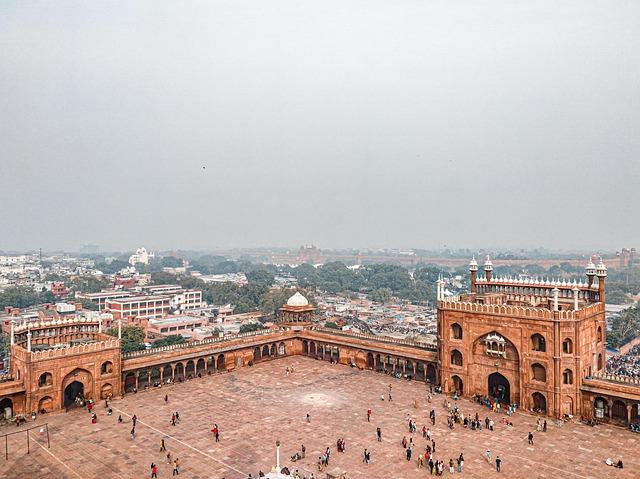New Delhi witnessed a surge of protests following reports that Chinese authorities have invalidated the passport of an Arunachali national, escalating tensions between India and China. The move, widely condemned by Indian officials and civil society, has sparked vocal demonstrations in the capital, highlighting growing concerns over Beijing’s treatment of Indian nationals from the northeastern state of Arunachal Pradesh. This latest development adds a new dimension to the already strained diplomatic relationship between the two neighboring countries.
New Delhi Condemns China Over Revocation of Arunachali’s Passport
New Delhi has officially registered a strong protest against Beijing following reports that an Arunachal Pradesh native’s passport was unilaterally revoked by Chinese authorities. The Indian government has condemned the action, labeling it a violation of the citizen’s rights and a blatant disregard for international norms. In a formal communiqué, the Ministry of External Affairs emphasized that such moves only escalate tensions in the sensitive border regions and undermine efforts toward regional peace and stability.
Experts highlight several key ramifications from this development:
- Diplomatic Strain: This act may deepen diplomatic discord between India and China amid ongoing border negotiations.
- Legal Concerns: Questions arise regarding the legitimacy of unilateral passport revocation without proper jurisdiction.
- Human Rights Implications: Potential infringement on the freedom of movement and citizenship rights of Arunachali individuals.
As the situation unfolds, the Indian government is reportedly exploring avenues for immediate redress and is closely monitoring developments to safeguard its citizens’ rights abroad.
| Aspect | India’s Stand | China’s Action |
|---|---|---|
| Passport Validity | Fully valid under Indian law | Revocation claimed citing security |
| Diplomatic Impact | Severe condemnation & protest | Asserted unilateral jurisdiction |
| Human Rights | Protection of citizen’s rights | Questionable breach of rights |
Implications for India-China Relations and Regional Stability
The recent incident involving the invalidation of an Arunachali individual’s passport by Chinese authorities has escalated tensions between New Delhi and Beijing, casting a shadow over an already fragile diplomatic rapport. This move is perceived by many in India as a direct affront to its sovereignty, particularly given the sensitive nature of Arunachal Pradesh, which China claims as part of its territory. Such actions threaten to undermine bilateral trust at a time when both nations are navigating complex border issues and economic rivalry. As a consequence, India is expected to respond firmly in diplomatic forums, signaling a refusal to tolerate infringements on its jurisdiction or the rights of its citizens.
The regional ripple effects of this development are significant. Countries in South Asia and beyond watch closely as India-China relations deeply influence the geopolitical balance. An erosion of cooperation could impede collaborative efforts in trade, infrastructure projects, and security alliances, potentially destabilizing the broader Indo-Pacific region. Key implications include:
- Heightened Military Vigilance: Increased border deployments and surveillance on both sides.
- Diplomatic Strain: Hindered progress on ongoing dialogues, including trade negotiations.
- Regional Security Concerns: Elevation of mistrust among neighboring nations reliant on Indo-China stability.
| Potential Impact | Short-Term Effect | Long-Term Consequence |
|---|---|---|
| Diplomatic Relations | Protests and formal grievances | Reduced cooperation on border management |
| Trade | Possible delays or restrictions | Shift towards alternative economic partnerships |
| Regional Stability | Increased alertness among neighboring states | Potential realignment of regional alliances |
Experts Urge Strengthened Diplomatic Channels and Legal Support for Affected Citizens
Global legal experts and diplomatic insiders stress the urgent necessity for India to bolster its engagement with international legal forums and diplomatic channels to protect the rights of its citizens abroad, especially those facing unprecedented nationality disputes. They advocate for a coordinated strategy involving multiple government departments to ensure prompt intervention and legal assistance for Arunachali individuals whose passports and citizenship documents have been invalidated under opaque foreign policies. This heightened focus on diplomatic advocacy aims to prevent further erosion of individual rights and to reaffirm India’s commitment to upholding international law standards.
Additionally, specialists recommend establishing a dedicated legal aid task force to support affected Arunachali citizens navigating complex cross-border legal hurdles. This includes:
- Provision of legal counseling and representation in both domestic and international courts.
- Fast-tracking consular assistance for citizens stranded or facing harassment.
- Coordination with global human rights organizations for monitoring and reporting violations.
| Recommended Actions | Expected Outcome |
|---|---|
| Strengthen bilateral talks with China | Improved resolution mechanisms for passport disputes |
| Launch legal aid programs | Empowered citizens with legal recourse |
| Engage international human rights bodies | Increased global awareness and pressure |
Key Takeaways
As tensions continue to rise between New Delhi and Beijing over the revocation of an Arunachali citizen’s passport, the protests in India’s capital underscore the deepening diplomatic rift. The incident has sparked widespread condemnation across political and civil society circles, calling for urgent dialogue and resolution. Both nations now face mounting pressure to address the issue transparently, as the broader implications threaten to impact bilateral ties and regional stability in the coming weeks. The Times of India will continue to monitor developments closely.




